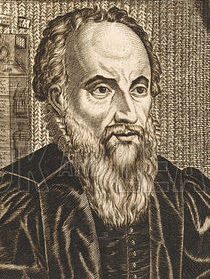| Profile | Major Works | Resources |
Charles Dumoulin, 1500-1566.

Charles Dumolin (also known as "Molinaeus") was a prominent 16th C. French legal scholar, and a notable commentator and defender of customary law. Charles Dumoulin's insistence on the supremacy of the monarchy over feudal lords and the church, and the constitutional basis of monarchical power, places him as the grandfather of Gallicanism, absolutism and natural law theories.
Charles Dumoulin was a Parisian native. After an initially brilliant career in courts and Parlement of Paris, Dumoulin converted to Protestantism in 1542 (first Calvinism, then after being condemned by the National Synod, Lutheranism, and then went on to his chase own peculiar mix of heresies). Fleeing from France, Dumoulin pursued a peripatetic lifestyle, teaching law at various European academies - Tubingen, Strasbourg, Dole and Besancon - for the next few years. During his absence, his 1552 commentary on the edicts of Henry II was condemned by the Sorbonne. In 1557, Dumoulin returned to Paris. But he was not yet out of trouble. He was arrested and jailed by the Parlement of Paris in 1564 for his brief opposing the Council of Trent, where he declared it inadequate on legal grounds and subversive of both church traditions and royal power.
Dumoulin's interest in common laws and practices drove him to examine the matter of contracts and usury in his 1546 treatise. Dumoulin was the father of the "autonomy doctrine" of contract - that is, that the intentions of the contractors, rather than territoriality, governs the validity and consequences of the contract. In his treatment of usury, Dumoulin demolished the Scholastic doctrine of interest, declaring credit productive and calling for the lifting of prohibitions. Curiously, Dumoulin also articulated a theory of money which asserted that intrinsic value of coinage was an implicit international contract.
|
Major Works of Charles Dumoulin
|
|
HET
|
|
Resources on Charles Dumoulin
|
All rights reserved, Gonçalo L. Fonseca
